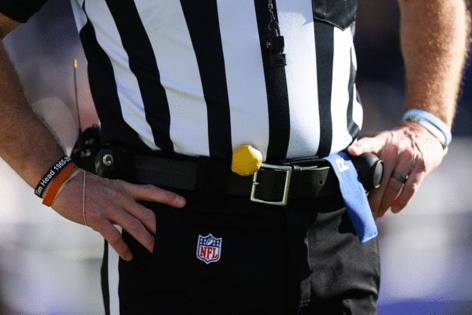Commentary: Time to reassess how NFL penalties hold back offenses
Published in Op Eds
The NFL season is well past the halfway point, with eyes focused on the 2025 Super Bowl in New Orleans, now just two months away.
The Detroit Lions and the Kansas City Chiefs have set the standard for excellence this season, despite some recent nail-biters, with both sporting near-perfect records. Close behind are teams like the Minnesota Vikings, Buffalo Bills and Philadelphia Eagles, hoping to have a say in who punches their ticket to the Big Game. But don’t assume that it’s just team performance that determines winners and losers. The penalty yards data point may be more significant than people realize.
The rules of fair play are enforced by a team of officials who use their knowledge and expertise, as well as video reviews, to get the calls right. The NFL Official Playing Rules is a 79-page document filled with every detail necessary to maintain a level playing field in every game.
The document includes 19 rules, ranging from the size of the playing field (Rule 1), the dimensions of the balls used during a game (Rule 2), clock management (Rule 4), and even what range of numbers each position can wear (Rule 5). Even diagrams of how the officials signal the different rule infractions are provided.
The Official Playing Rules also defines what constitutes rule infractions, and how penalties are assessed. In fact, the document contains the word “illegal” 261 times and the words “penalty” or “penalties” 309 times. A summary of all possible rule infractions shows that the officials have their hands full in understanding and interpreting each play in real time.
Consistency is important. For most rule infractions, the offending team is penalized with both yards and down count adjusted. However, there are some infractions for which the penalties are outliers, using either/or, not and. This is particularly true with rule infractions on defense.
The three most common rule infractions are offside, pass interference and holding. For defensive offside, this penalty is called after the play is completed. If the team on offense accepts the penalty, they are given 5 yards, with the down replayed. If they gain significantly more yards, they can decline the penalty and accept the play. This means that the penalty is a choice between either/or, or and.
Such a choice makes no sense. Since the team on defense commits a rule infraction, they should be penalized with 5 yards and the outcome of the play if the team on offense advances the ball beyond the line of scrimmage.
The same principle applies to defensive pass interference. The team on offense gets the ball at the spot of the foul, independent of whether the receiver catches the ball. If the player does catch the ball, why not add another 5 yards to the play?
Defensive holding can also fall into this group. If the play is not called dead and the team on offense gains positive yards, add the penalty to the yardage gained, not just giving them 5 yards and a first down.
There are similar situations in both the NBA and the NHL that adjudicate the penalties appropriately.
In the NBA, if a player is fouled in the act of shooting and scores the basket, the player is given the points and a foul shot as an "and one," the opportunity to complete the three-point play. In the NHL, if a player commits a rule infraction, and their team is not in possession of the puck when a referee signals the delayed penalty, then the other team can send their goalie to the bench to add a sixth skater for as long as the team on defense does not touch the puck and gain offensive possession, or the team on offense scores a goal.
In both these cases, the team that is penalized pays the maximum penalty possible, not a choice amongst good options that the NFL defensive penalties provide.
The NFL rules for defensive infractions noted here need a refresh to more appropriately penalize teams that violate the rules, while giving offenses a better chance to benefit from the penalty. Given that these defensive penalties are some of the most common rule infractions, the result can only lead to more scoring, something that fans welcome and would support the eventual Super Bowl champion, which tend to have more highly ranked offenses than defenses.
Professional sports rule changes take time and thoughtful consideration before being installed. In this case, these three defensive penalties would be more in line with other rule infraction penalties. Indeed, it is time to penalize the defense violator appropriately with ands, not either/ors.
____
Sheldon H. Jacobson, Ph.D., is a professor in computer science who teaches in the Carle Illinois College of Medicine at the University of Illinois at Urbana-Champaign.
___
©2024 Chicago Tribune. Visit at chicagotribune.com. Distributed by Tribune Content Agency, LLC.




























































Comments